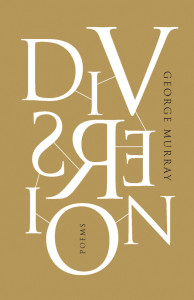Review by Selina Boan
 Diversion
Diversion
by George Murray
ECW Press, 2015
Sitting down to read George Murray’s seventh collection of poetry, aptly titled Diversion, I found myself entering a world of one-off lines, aphorisms and clever hashtag titles (such as “#UseYourEmojination”, “#DaysEndConfused”, and “#UCan’tDoucheThis”). A world not unlike the experience of scrolling my Twitter feed or Google search headlines, only in book form, and not filtered according to my likes or search preferences.
In Diversion, Murray gives us the unfiltered, seemingly divergent thoughts of a speaker unafraid of becoming “the monster that aggregates all the channels.” (13) This is a speaker open to all streams of thought and data, who might say or proclaim something that makes you uncomfortable, or angry. A speaker who might prompt one of those quiet, reflective hmmms you hear at poetry readings with the moving observation that “windows are a house’s stanza breaks” (52) or cause you to laugh out loud on the bus as you read lines like “I survived Seamus Heaney and all I got was this lousy career” (7) before pulling out your phone to check a text message ping or a Facebook update. The speaker in Diversion is Murray’s response to the contemporary world where “the primary currency of this moment is distraction.” (49)
In an interview with Open Book Toronto, Murray explains that the evolution of his latest book grew from the question: What happens when a poet embraces the incoming noise of modernity rather than trying to block it out? Diversion is the result of Murray’s efforts, a careful recording of everyday thoughts and ideas that take the form of non-linear, aphorism-like poetry. Murray explains that “of course, the vast majority of [these thoughts and ideas] were idiotic, or profane, or pornographic, or otherwise horrifying…Sometimes I had an idea while watching a sitcom, other times while watching a cat video, other times while shopping Amazon…I decided to keep it all- the good, the bad, and the ugly-and see what came of it.”
At times, Murray’s decision to keep it all perhaps went a little too far. And most likely, this is the point. Murray asks the reader to question how we navigate information, how we respond to things that might be difficult to read or see. There is no table of contents to guide our reading of the 30 poems that make up this collection, nothing that sorts out the mundane and the sarcastic, the good from the ugly. Lines like “no means no one said you could speak” (34) or “coffee shops are training grounds for teens learning to flash their panties at old men” (46) got my feminist wheels turning and left me feeling uncomfortable, and at times, frustrated with the text. Like a gutsy comedian, the speaker in these poems certainty doesn’t shy away from things that might be construed as politically incorrect, and like a good comedian, the speaker always manages to bring you back to laughter with lines where “old men don’t fist bump so much as try to shake arthritic hands” (45) and “smooth jazz is God’s peristaltic grumble.” (64)
Diversion positions itself in conversation with the work of poets such as Rachel Zolf, Kathryn Mockler and Sam Riviere who have been utilizing technological filters and search engines to organize and experiment with the vast array of information we have access to in the contemporary world. By contrast, Murray asks what happens to a text when filters used to organize or arrange information are removed. Mimicking the constant stream of divergent data we are presented with everyday on our cellphones, computers, and televisions, he leaves the conceit of filtering up to the reader. For example, in the poem entitled “#EasterEggStacy”, the speaker states:
There must be a billion funerals a day in Mario Land.
52-hertz whale picks up an old KGB numbers station in its teeth.
Celebrity is a commander at attention before an audience of soldiers at ease.
Were Madonna’s arms always so veiny when miming something racy?
Porn is becoming its own countryside.
You see yourself as a perfect snowflake but you’re part of a blizzard. (15)
Over the course of six lines, the speaker threads through videogames, whales, celebrity, sexuality, porn and myths of individualism. The lines are compact; each one could be plucked out of the poem and read alone. Together, they create a fragmented narrative that suggests the ways in which modern technology has changed the way we think, write, and process information. The reader is left wondering: which lines are seemingly mundane reflections? Which lines represent a moment of profound realization?
In Diversion, Murray contemplates the diminishing time and space available for quiet reflection and our ability to ruminate and filter our own thoughts. At turns both frustrating and humorous, satirical and wise, Diversion glares us in the eye and asks us, “is this thing even on?” (68)
Selina Boan is a poet and fiction writer whose work has appeared in Ottawater, Experiment-O and In/Words Magazine, among others. Her chapbook entitled, An Act of Distillation was released by In/Words Magazine and Press in 2013. She lives in Vancouver and is currently completing her MFA in Creative Writing at the University of British Columbia.